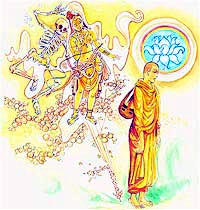25 01 2012 LESSON 504 Dhammapada Verse 46 Who Conquers Death?
FREE ONLINE eNālandā
Research &
Practice UNIVERSITY & BUDDHIST
GOOD NEWS
LETTER
Through http://sarvajan.ambedkar.org
WINNING GOOD
KAMMA!
To ATTAIN NIBBANA!
BY
GIVING MASTERKEY!
TO MAYAWATI!
OF BSP!
By Broad minded Entire Uttar Pradesh People giving her seats Three Hundred and Three!
THE BUDDHIST ON LINE GOOD NEWS LETTER
COURSE PROGRAM
LESSON 504
Practice a Sutta a Day Keeps Dukkha Away
Sambodhi Pujana Dhatu Stupa andmeditation Kuti are built in MahabodhiSociety, Bangalore on 8th March 2012. Kindly Donat. Hlp needed urgently.-Yours Ananda Bhante
DR BR AMBEDKAR IS NO 1 TALENTEDPERSON IN THE WORLD-Last month’s analysis of top 100talented persons in the world-Cambridge University London displayed the list.Out of 100 the first talented person is Dr Baba SahebBhimrao Ambedkar.

Verse 46. Who Conquers Death?
Having known this froth-like body
and awakening to its mirage nature,
smashing Mara’s flowered shafts
unseen beyond the Death-king go.
Explanation: This body of ours is like froth, bubbles, or
foam. It disintegrates quickly. The nature of life is like a mirage,
an illusion. Therefore, one must give up these unrealities. To achieve
that one must destroy Mara’s flower-arrows by which he tempts
men and women. It is necessary that the truth-seeker should go beyond
Mara’s region, to areas unseen by him. Mara knows only the realm
of death. The truth seeker goes beyond that region to the ‘deathless’
(Nibbana) - a domain Mara has never seen.
Dhammapada Verse 46
Maricikammatthanika bhikkhu Vatthu
Phepnupamam1 kayamimam viditva
maricidhammam2 abhisambudhano
chetvana marassa papupphakani3
adassanam maccurajassa gacche4
Verse 46: One who knows that this body is impermanent like froth, and
comprehends that it is insubstantial like a mirage, will cut the flowers of Mara
(i.e., the three kinds of vatta or rounds), and pass out of sight of the
King of Death.
1. Phepnupamam: like froth; it means that this body is perishable and
impermanent like froth.
2. maricidhammam: lit., mirage + nature; nature of a mirage, i. e.,
insubstantial like a mirage.
3. marassa papupphakani: flowers or flower-tipped arrows of Mara.
These flowers or arrows of Mara represent the tivattam or the three kinds
of vattam (rounds), viz., kilesavattam ( the round of moral
defilements), kammavattam (the round of volitional action) and vipakavattam
(the round of resultant effects). According to the Commentary, this chain or
round is broken when cut by the sword of ariya magga nana.
4. adassanam maccurajassa gacche: In this context, out of sight of the
King of Death means the realization of Nibbana.
The Story of the Bhikkhu who Contemplates the Body as a Mirage
While residing at the Jetavana monastery, the Buddha uttered Verse (46) of
this book, with reference to a certain bhikkhu.
On one occasion, a certain bhikkhu, after taking a subject of meditation from
the Buddha, went to the forest. Although he tried hard he made little progress
in his meditation; so he decided to go back to the Buddha for further
instruction. On his way back he saw a mirage, which, after all, was only an
illusive appearance of a sheet of water. At that instant, he came to realize
that the body also was insubstantial like a mirage. Thus keeping his mind on the
insubstantiality of the body he came to the bank of the river Aciravati. While
sitting under a tree close to the river, seeing big froths breaking up, he
realized the impermanent nature of the body.
Soon, the Buddha appeared in his vision and said to him, “My son,
just as you have realized, this body is impermanent like froth and insubstantial
like a mirage.”
Then the Buddha spoke in verse as follows:
Verse 46: One who knows that this body is impermanent like froth,
and comprehends that it is insubstantial like a mirage will cut the
flowers of Mara (i.e., the three kinds of vatta or rounds), and pass
out of sight of the King of Death.
At the end of the discourse the bhikkhu attained arahatship.